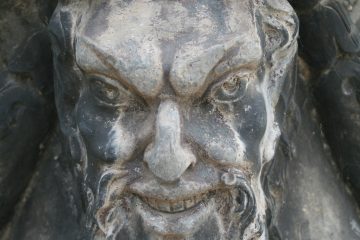Tokusan (780 – 865) was a tough and cantankerous Chinese Zen master. He wielded a menacing bamboo stick. His Zen pedagogy was known as ‘Tokusan’s thirty blows’. Tokusan would say to his disciples: “If you speak rightly I will give you thirty blows. If you speak wrongly, I will also give you thirty blows.”
Tokusan was not noted for his wit, charm and bonhomie.
Does Zen nurture the wise stewardship of bamboo trees? By the way some species of bamboo can grow up to 2.9 feet per day which is incredible.
Zen teachers deploy paradoxical koans to provoke disciples to find enlightenment. A Zen master was once asked about the purpose of Zen and he summoned this enigmatic koan: “The withered tree is giving a dragon’s roar.”
How do we make sense of this?
The Diamond Sutra, beloved of Zen mystics, proclaims that ultimate reality is the ‘void’ or ’emptiness’. On this view everything is in radical flux. Nothing is permanent. This mindset radically rejects biblical teaching about God’s good creation. In this silent, empty realm there are no individual creatures or bamboo trees at all. Angels, stars, planets, mountains, trees, birds, humans do not exist as distinct entities.
For the Zen believer biblical teaching is profoundly wrong. Scripture reveals to us that we humans are different from plants, insects, birds, animals and viruses like COVID. This way of thinking urges us to look at a bamboo tree and say: “I admire this dynamic tree for growing so fast but I am not this tree.”
In biblical teaching we look after bamboo trees as wise and responsible stewards (Gen 2:15). We notice them as the handiwork of God and we serve them by honouring their created goodness. Bamboo trees are truly amazing and we flourish by tending the garden with wisdom, care and love.
Zen instructs us that normal, everyday thinking causes pain, despair and suffering. The Buddhist doctrine of no-self proclaims that the illusion of a permanent self is devastating. The false belief that I exist as a separate Self fans the flames of desire and craving which leads to suffering. Zen Buddhists believe that we must escape from this false way of looking at the world.
Zen proclaims that there is a solution to this misery and this is why Tokusan insisted on beating his apprehensive students with his bamboo stick. Tokusan wanted to shock his disciples and challenge basic logic. He was trying to show his followers the folly of dualistic thinking (it’s either this or that) and the profound misery that this false thinking brings. At the end of the day there are no menacing bamboo sticks. There are no individual persons like you and me.
Zen takes us to a realm where logic no longer applies because everything has fused into a timeless and formless reality. According to the Zen scholar D.T. Suzuki (1870-1966) Zen obliterates God, minds and even the distinction between good and evil. When we stop thinking in this dualistic way and realise that everything is an illusion then we are liberated from fear and suffering.
This is the purpose of Zazen meditation. As we meditate we can enter a formless, boundless realm where all distinctions fade away. Some mystics call this ‘oneism’. Others call this pantheism (God is everything). Trees become fused with us. Eventually after much dogged, exhausting spiritual labour we vanish into a mystical unity.
It is helpful to point out that traditional forms of Buddhism do not go as far as this. Many Buddhists believe in karma and reincarnation. They believe that rebirth can lead to four possible destinations: hell, earth, heaven and nirvana. This teaching can be found in the Dhammapada. For Zen believers this view is still stuck in a form of dualism which denies ‘oneism’. When we talk about rebirth and the thousands of lives that we must live before we find nirvana (salvation) we are still making distinctions about time and karmic bondage. The Diamond Sutra tells us to stop doing this.
Consider this story. A Zen master was once asked if he believed that Auschwitz was evil. He looked troubled and despondent as he replied rather sheepishly: “To be honest I can’t say that what the Nazis did was evil. To say that would be to affirm dualism. As a Buddhist I can’t do that.”
Without doubt many Buddhists often show exemplary moral character and Buddhist sacred texts call for the cultivation of virtues like self-control and compassion. However there is a deep tension between such moral obligations and the belief in the ‘void’ where all moral distinctions have vanished.
This brief outline of Zen Buddhism can establish this firm conclusion.
If we are committed Buddhists why should we care about bamboo trees if they do not exist?
- Was Spinoza Right about the Devil? - June 23, 2025
- Kim Kardashian and how her family was rescued from the Armenian Genocide - May 26, 2025
- The Incredible Story of the Slave who became a Famous Scientist - April 26, 2025



5 Comments
Ted Newell · August 15, 2022 at 7:43 pm
Enlightenment, says the world, ain’t nothing but a dream. It’s just non-attachment, non-attachment. I think I’m quoting from Van Morrison. Francis Schaeffer used to the point…Hinduism and similar faiths couldn’t make much of cruelty. On one famous occasion, he invited someone he was talking to to ask Francis NOT to pour a pot of tea on his head, because cruelty and non-cruelty Are the same in Monist thinking. Needless to say, his friend didn’t want A pot of tea poured over him. But I guess I’d say that the fact that God in Jesus suffered and died on my behalf for my sake for the love of me, makes Christianity even possible for me. There is suffering in the world, that is for sure. The Buddhist s have that much right. But God is taking steps to make it better in the end.
Andy Lenton · August 16, 2022 at 1:07 pm
On the back of Mark’s article and Ted Newell’s Van Morrison quote I find the lyrics to a song called ‘Grace’ by U2 a brilliant and helpful response to Karma and Bhuddism.Grace
She takes the blame
She covers the shame
Removes the stain
It could be her name
Grace
It’s the name for a girl
It’s also a thought that
Changed the world
And when she walks on the street
You can hear the strings
Grace finds goodness
In everything
Grace
She’s got the walk
Not on a ramp or on chalk
She’s got the time to talk
She travels outside
Of karma, karma
She travels outside
Of karma
When she goes to work
You can hear her strings
Grace finds beauty
In everything
Grace
She carries a world on her hips
No champagne flute for her lips
No twirls or skips between her fingertips
She carries a pearl
In perfect condition
What once was hurt
What once was friction
What left a mark
No longer stings
Because Grace makes beauty
Out of ugly things
Grace finds beauty
In everything
Grace finds goodness in everything
Source: LyricFind
Songwriters: Adam Clayton / Dave Evans / Larry Mullen / Paul Hewson
Grace lyrics © Kobalt Music Publishing Ltd., Universal Music Publishing Group
Fantastic article Mark. Thank you!
Duncan Stow · August 18, 2022 at 7:21 am
Thank Rocky – really helpful in understanding a very different world view to my own and some of the challenges that Zenist thinking leads too
Duncan Stow · August 18, 2022 at 7:22 am
Thanks Rocky – helpful explanation of some of the problems that Zenist spirituality lead too
Guy Donegan-Cross · August 23, 2022 at 11:58 am
Thanks Rocky – you explain a lot in an accessible and enlightening way – brilliant
Comments are closed.